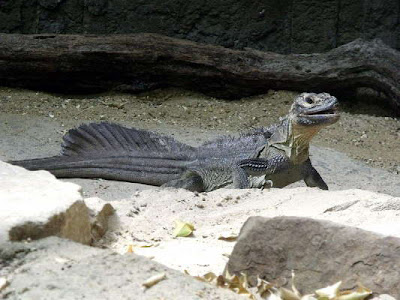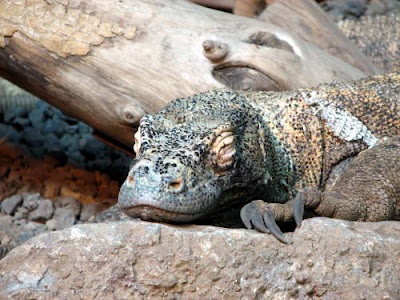10. Phrynocephalus

Also called Toadhead Religion, small lizards that live in the desert shows some strange behavior. They communicate with each other with lower and raise their tails, their bodies shook as quickly bury themselves in sand and will scare off predators with a strange and frightening look, mouth, colorful, visible here. -->
9. Brookesia minima

Chameleon is a reptile that is very unique, with their toes fused into a lobster like pincers, tail they can hold, they express their moods by changing colors, binoculars like eyeballs they move independently of each other and their long tongues to be launched during the insects such as harpoon guns. Not unusual type of chameleon is Brookesia minima, dwarf chameleon leaves, which became one of the smallest reptiles ever found a human.
8. Phrynosoma

Lizard is nicknamed "horned frog", the body fat covering the thick protective horns and thorns. Inhabit dry land, sandy environments, they eat ants and are marvelous mechanisms boasts one of the most horrific in nature defense, when frightened, some species can drain the blood pressure in their heads to the small vessels around their eyes burst, spraying blood flow to the attackers, the possibility of a type of blood is taken from amino acid in the ants, allowing mammalian predators know that attacking fat lizard is just wasting their time but unfortunately, the birds are not too concerned with this sour spray
7. Moloch horridus

Although completely unrelated to the horned toads, or lizards' thorny devil "," moloch "has developed many of the same characteristics in response to the desert environment, including spiny bodies, sand and camouflage the diet by eating ants.Their spines make this lizard is rather difficult to be swallowed by the predator,
6. Hydrosaurus pustulatus

Seeing as it crawled straight from the Permian era, Philippine sailfin lizard is omnivorous amphibian-eating fruits, nuts and other small prey insects in a tropical river. Their toes flattened allows small specimens to escape predators by walking on water, a trait which is also owned by the lizard "Basilisk" or lizard "Jesus." Adult males who are known to have a beautiful blue, red or even a color pattern purple, which you can see here:
5. Amblyrhynchus cristatus

Galapagos marine iguana island boasts a lifestyle that is not owned by other reptiles, such as penguins or sea lions, they spend their entire lives on the shoreline, diving into the water for their food. Charles Darwin is known disgusted by these animals when he first found it, and call these lizards with the nickname "" IMPS of darkness. "
4. Flying Gecko

Many geckos have an uncanny ability to run on any surface - even glass smooth - thanks to a microscopic branch of the skin on their toes, Velcro-like material at the molecular level. Flying Gecko using webbed feet, broad tail and flutter of the skin to glide from tree to tree, like a flying squirrel.
3. Heloderma suspectum

almost similar to the "lizard beads," Gila Monster never been recognized as one of the lizards in the world with a venomous bite, providing a painful neurotoxin through a small groove ang sharp teeth, we now know that there are also other lizards that have a can, even with the poison lightweight, and lizards "Gila Monster" is still the most toxic
2. Bipes biporus

Mexico or mouse lizard "steel Worm" is technically not a lizard or a snake, but this strange Amphisbaenian. Reptil limbs generally have less in sight, spending their entire lives underground where they hunt for worms and insects. B. biporus is quite strange, because it has two front legs with claws Keil but do not have the hind legs
1.Varanus komodoensis

Komodo is the largest carnivorous lizard that is still alive today, sometimes reaching nearly ten feet in length. Although many of their carcasses rotting food, they will also pursue large prey such as deer live to give you a bite, after that they just have to wait when the victim began to lose blood and exposed infection. cause eating carrion, their saliva is quite rich with bacteria which could seriously weaken the prey, and recent studies have shown that they also have poison. The dragon is native to Indonesia to loosen their jaws, stretch their necks and pulled out red colored lubricant to swallowed whole body.
Read This Article Too Meaning and Extent of the British Empire Royal Degree